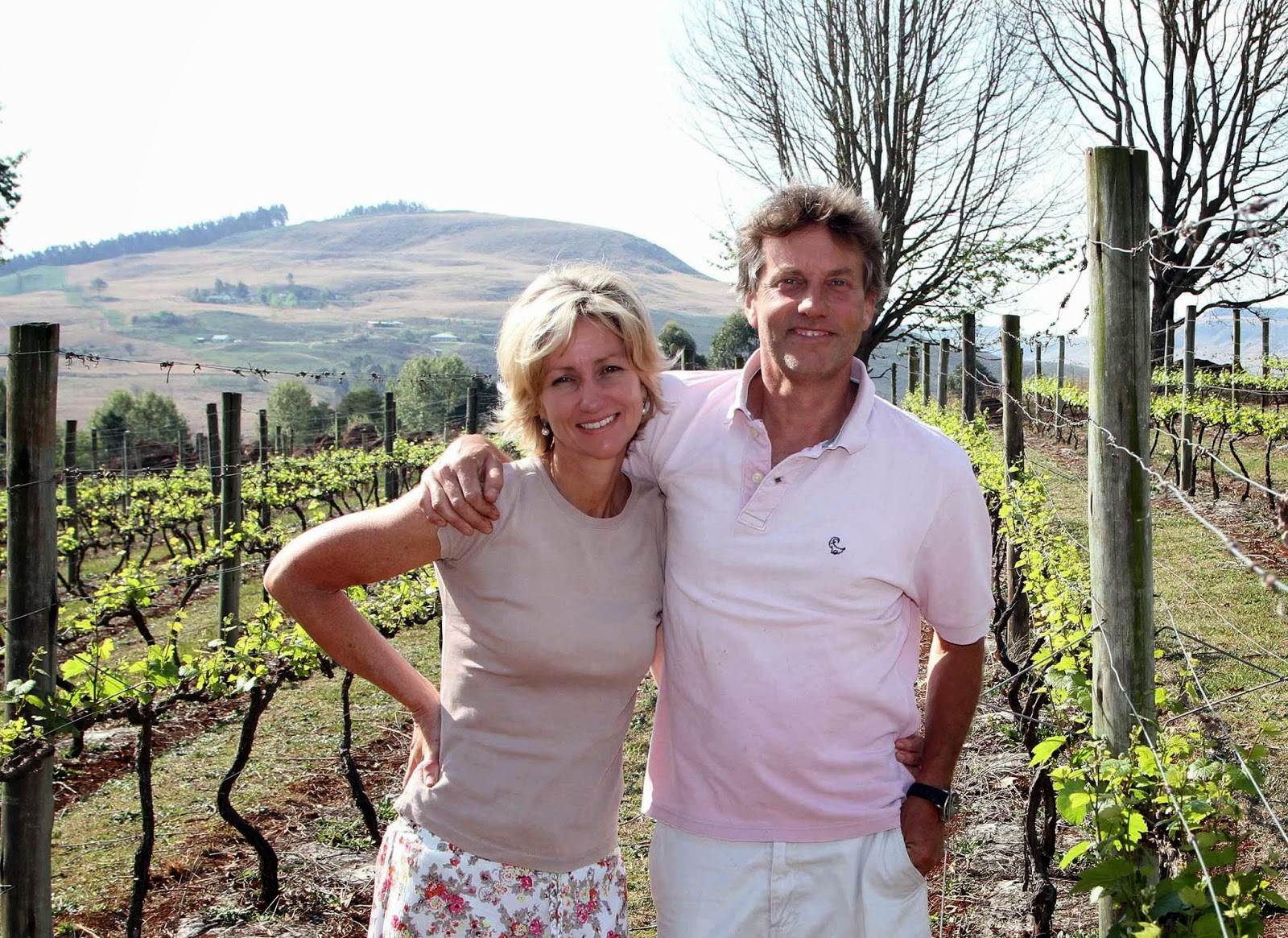Making Wine in the Midlands with Jane and Ian Smorthwaite
The sun, with all those planets revolving around it and dependent on it, can still ripen a bunch of grapes as if it had nothing else in the universe to do. Thus marvelled astronomer and physicist Galileo Galilei. He could well have been talking about the thriving Abingdon Wine Estate in KwaZulu-Natal, writes Peta Lee.
The province’s only certified single vineyard estate has been quietly making a name for itself over the past decade, producing some 12,000 bottles a year. It’s hardly surprising, then, that some of the Cape’s winemasters are now eyeing this part of the world with interest.
It’s a remarkable story, because few vines have done well in KwaZulu-Natal. However, according to Ian and Jane Smorthwaite of Abingdon Wine Estate, because of global warming, temperatures are increasing in the traditional Cape Winelands. As a result, one day, the KwaZulu-Natal Midlands could be the new Stellenbosch or Franschhoek!
Abingdon owner-winemaker Ian Smorthwaite quotes an online article he read recently that predicted: “By 2050, a two-degree rise in temperature could see the end as we know it of the Cape Winelands except for cooler, high altitude regions. The effect of global warming is increasing sugar levels before physiological ripeness, giving high alcohol levels, which is becoming unfashionable. The public wants a more delicate, elegant wine.”
When this former oilfield engineer and his wife, Jane, first relocated from Gauteng 14 years ago, they bought their farm Abingdon with the intention of settling in a quiet, pastoral area, and continuing to run their furniture business. It also gave them a chance to be closer to their son, who had just won a scholarship to Michaelhouse in Balgowan.
In Johannesburg, they had run a successful furniture supply company, and “thought we could carry on with that while living this gentlemen’s existence in the country”, says Jane. “We’d always travelled a lot, especially to France, and we loved wine. When we bought Abingdon, it had nothing on it and we thought, why not?”
Their first vines were planted in 2004, and they bottled their 2007 Cabernet Shiraz blend in 2008. Progress has been phenomenal: Thousands of bottles produced, 2.5 hectares under vine, and the release and swift sales of 40 certified estate wines all representing unique KwaZulu-Natal Wines of Origin. 2014 has seen the release of five new certified estate wines: a Sauvignon Blanc, a Viognier, a Chardonnay, a Blanc de Noir, and a special release Cabernet Sauvignon Syrah Blend to celebrate their first ten years in the industry.
The 2013 Viognier is particularly good, and was applauded at this year’s prestigious Decanter Wine Awards in London, winning a bronze medal competing against 15,000 wines from around the world.
The road to this success has been a fairly bumpy one, however, and no mean feat. Ian explains that they hadn’t broken even yet, but fortunately, since the 2009 opening of their massively popular tasting room and restaurant, they’re staying afloat. Their restaurant is open Saturdays, Sundays and public holidays for tastings and lunches (all cooked and prepared by Jane), and visitors can also buy wine on site. The venue can also be booked out for private and corporate functions. With the demand for Abingdon wines escalating steadily, the future for the estate looks, well, blanc de noir!
One might wonder how a petroleum engineer knows all the myriad and complex vagaries of viticulture without doing a time-consuming degree. “Ian has spent hours and years researching the subject,” explains Jane, “talking to Cape winemakers, reading books, having lengthy discussions with experts.” In fact, he’s also probably one of the few winemakers who knows exactly how many vines he’s got – 6,000! But that’s because he prunes every single one of them himself. They also handpick 11,500 kg of grapes every year.
Abingdon wines have been highly rated worldwide, and you’ll find them on exclusive wine lists at upmarket KwaZulu-Natal venues like The Beverly Hills Hotel, The Oyster Box Hotel, Hartford House, Fordoun Spa, and 9th Avenue Bistro, among others.
They’ve kept their distribution to outlets fairly small, they say, because they sell relatively large quantities from the estate. “We have to keep stock on hand because the restaurant is open twelve months of the year,” Jane explains.
 Challenges, added the pair, have been many – and unorthodox! “Monkeys are the bane of our lives. We’ve erected hundreds of kilometres of costly electric fencing as well as chicken wire, which still doesn’t deter them. And then there are the thousands of birds that have a penchant for the grapes.”
Challenges, added the pair, have been many – and unorthodox! “Monkeys are the bane of our lives. We’ve erected hundreds of kilometres of costly electric fencing as well as chicken wire, which still doesn’t deter them. And then there are the thousands of birds that have a penchant for the grapes.”The Lion’s River area in which Abingdon is situated, provides “the perfect continental climate”, says Ian. “Our summer rainfall is a little on the high side, but not insurmountable. Interestingly, I battled with the Chardonnay vines, and after two years someone from the Department of Agriculture said I was wasting my time and should just pull them out. I dug them all up and moved them 130 metres further up the slope, where it was warmer. Now they’re thriving. Conversely, we replanted that area with Sauvignon, which loves it.”
It’s been said that picking grapes by the light of the moon is the way to do it, but Ian grins at the notion. “You can’t see the puff adders in the dark – and we have lots of them here – and you’re also likely to cut off your fingers.”
Currently Abingdon produces 12,000 bottles of wine annually, with production expected to ramp up to 15,000 bottles soon. They’re also already making their first sparkling wines this year, white and pink, which they hope will be “fantastic”.
Cheers to that!

0 comments :
Post a Comment